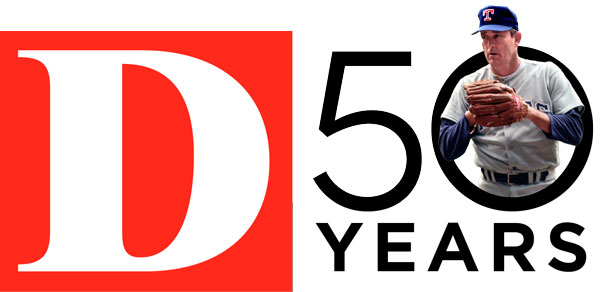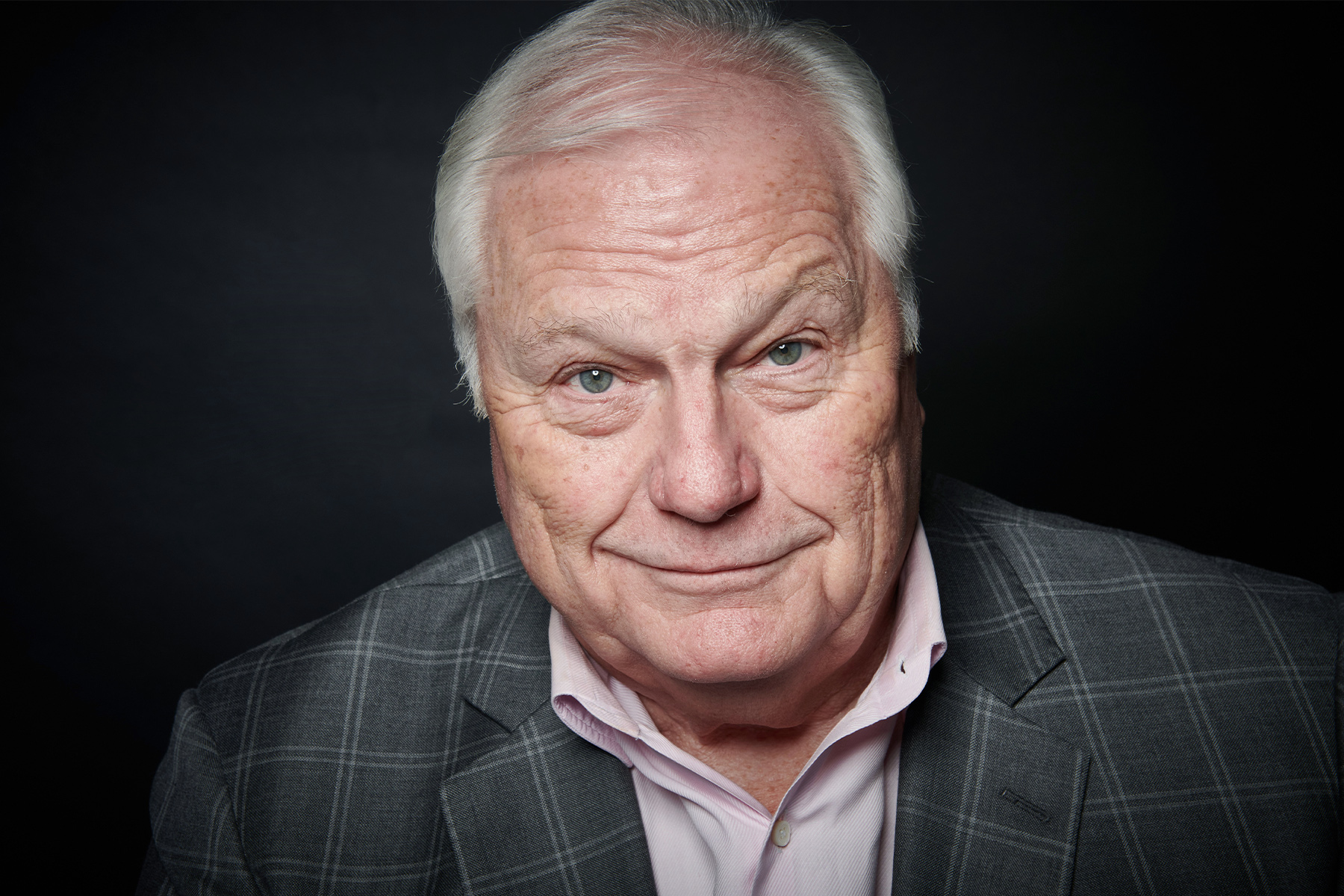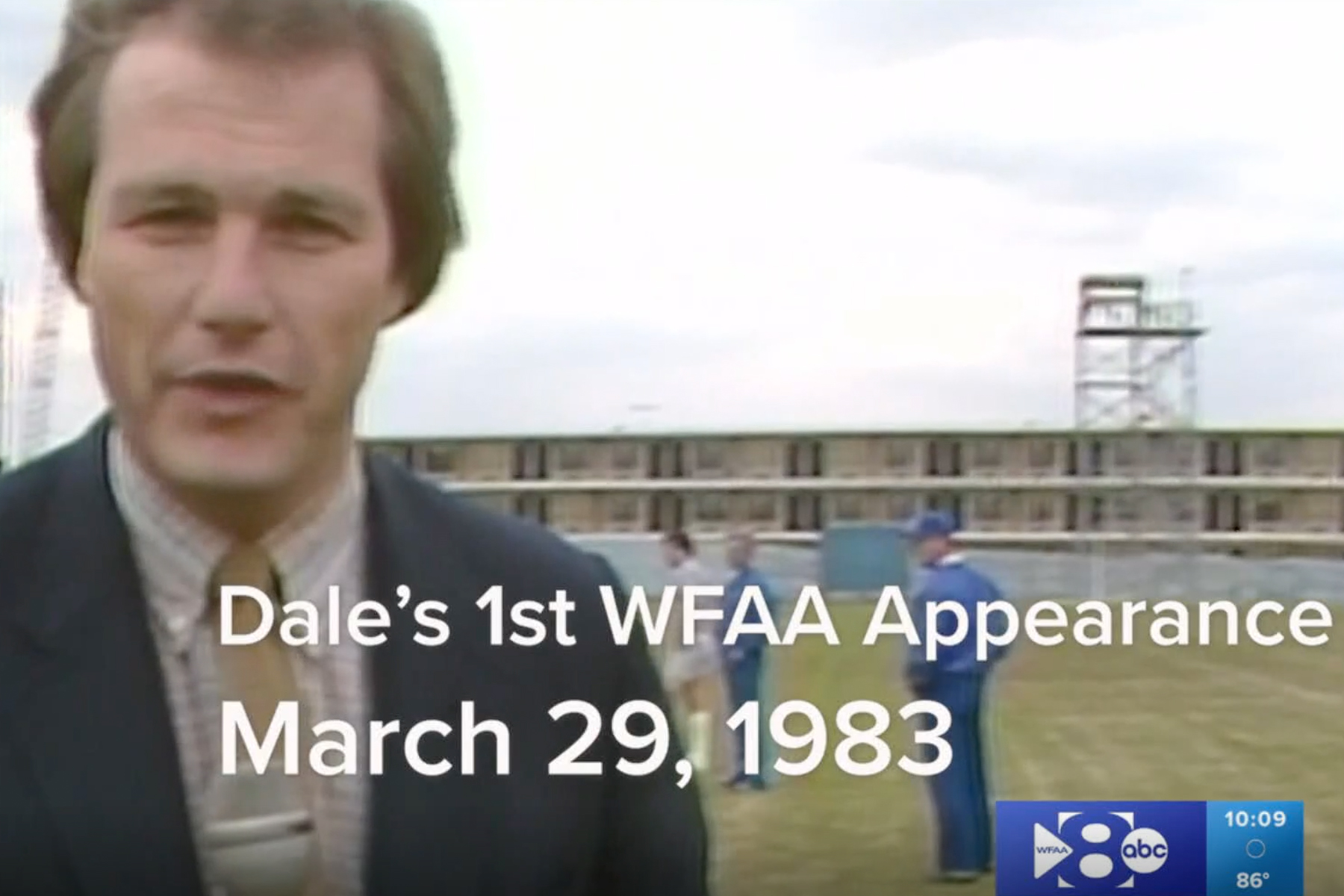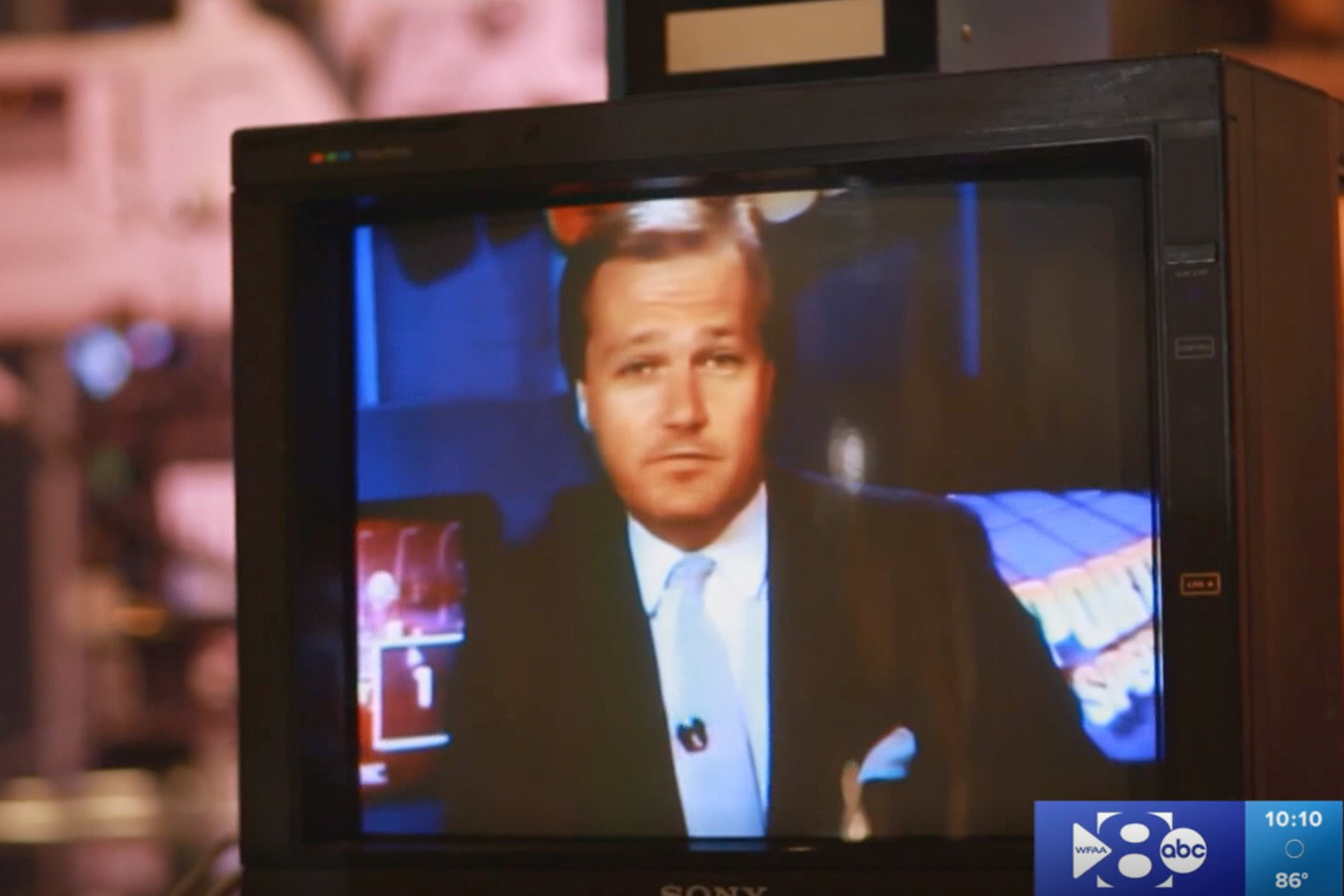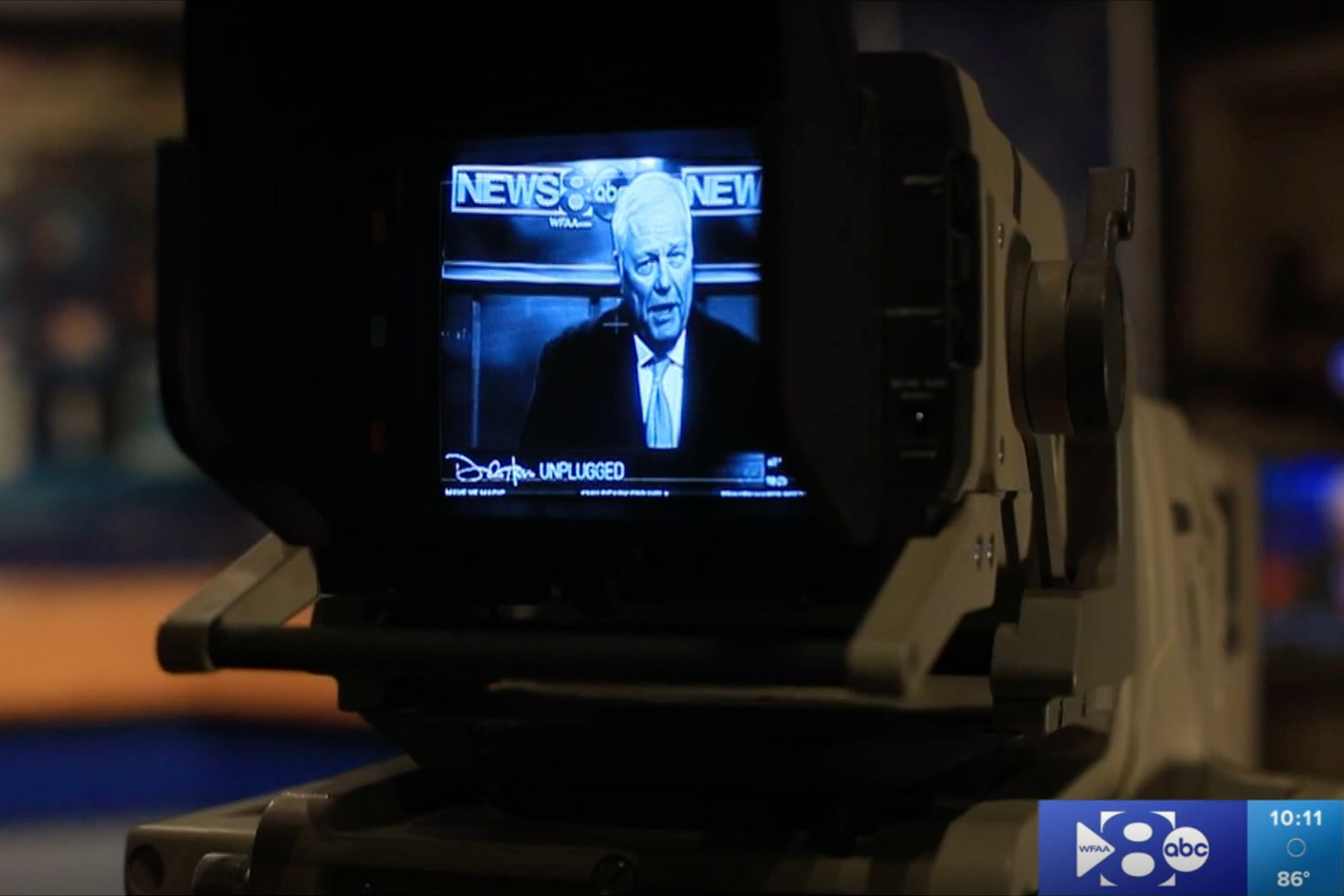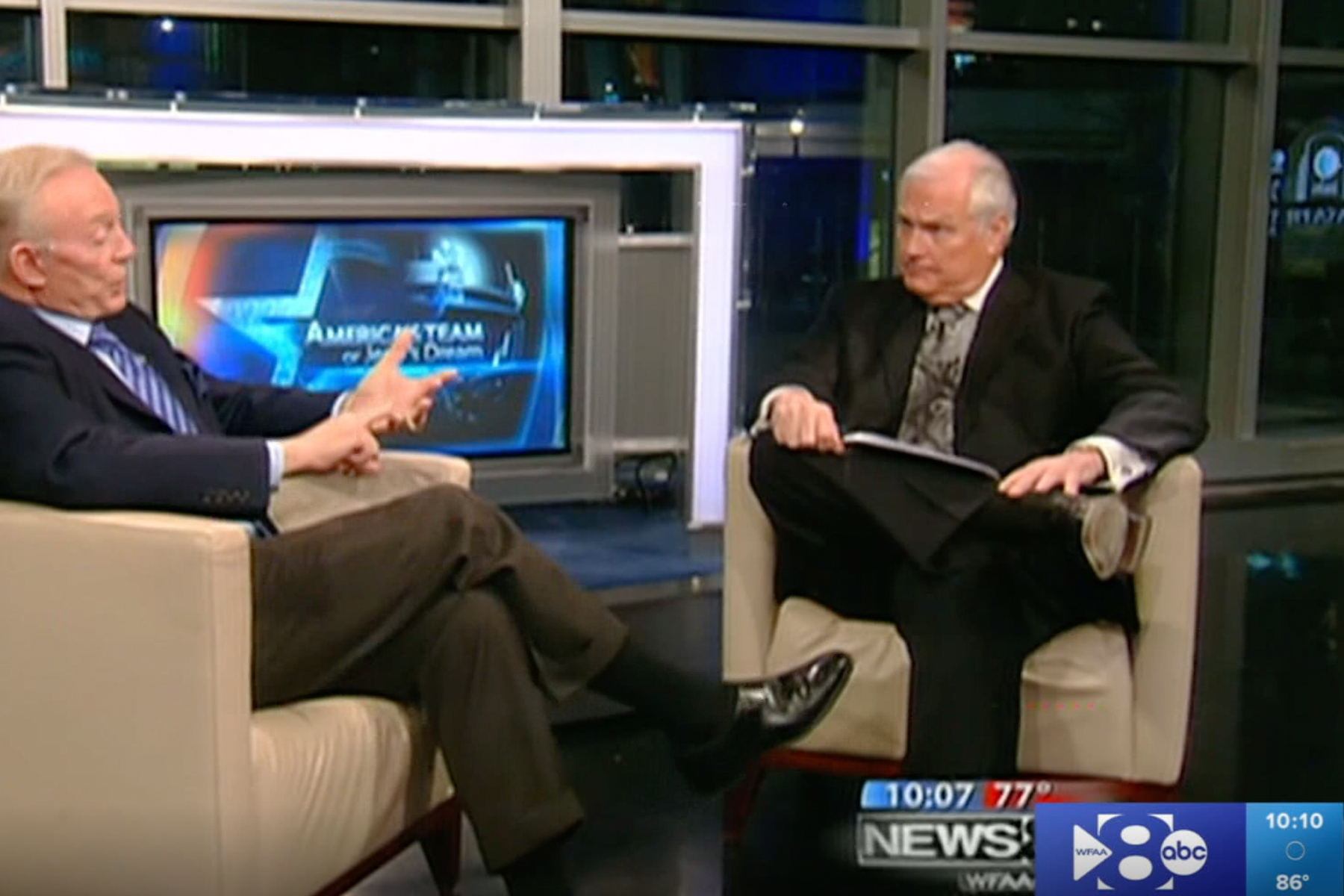It’s 4:50 in the afternoon on his last day of work, and Dale Hansen is wearing his bathrobe. He loves his bathrobe, which makes this a not altogether uncommon occurrence. But this wasn’t how he imagined he’d go out.
Once upon a time, he imagined a grand sendoff—nothing on par with the epic thousand-person bashes at his old house on Lake Waxahachie but at least 150 or so people crammed into Javier’s, one of his favorite haunts. That’s if he retired at all; for years, the party line was he’d go until he dropped dead, and his wife of 39 years, Chris, absolutely believed it.
The pandemic nixed the blowout and helped accelerate the bow-out, and now here he is, wrapped in the navy blue robe and nestled into a red Navajo-print chair in the sitting room of his Waxahachie home. WFAA’s 4 o’clock newscast plays on mute on a television mounted over the fireplace mantle. A black Lab named Wilson, one of their five dogs, is sprawled out on the floor to his left. He’d just finished reentering his final commentary into WFAA’s system for tonight’s show, a process that took 40 minutes after a technical snafu erased the first effort. He has already rehearsed his remarks four times today, a high number considering he wrote them back in February and, as of at least a month ago, could recite many of the lines from memory.
In a different world, people would be buzzing in and out of the house. Today there are four. “I’ve downsized like Obama,” he cracks, referencing the former president’s recently scaled-down birthday party. Which suits him fine because, after Chris, the person he needed here most is sitting diagonally from him, over on the couch.
Dannie Livingston met Hansen in 1977 at Omaha’s KMTV, when the station was looking for a weekend sports anchor. Hansen was an unconventional choice, shaggy-haired with no sports experience. He’d never been on camera before, either, which made Livingston the first to encounter the magnetism Hansen would become famous for once the red light flickered on. “It was spooky to a certain point,” he says. “It was almost that his eyes were pulling you into the story.” Once Hansen showed up in a suit, with a fresh haircut, he was hired.
Livingston spent the next two and a half years molding him into a professional broadcaster, drilling in the fundamentals while demanding Hansen never be afraid to buck convention, such as integrating high school sports coverage into his newscasts in Nebraska and later Dallas, before any of the competition thought to try it. Hansen retained everything, and always stayed eager to credit Livingston for the accolades that would follow, over the next four and a half decades. It only followed that his “all-time, all-time favorite mentor” had to be there for the end, so Hansen flew Livingston and his wife, Kathy, down for the week.
Now they’re rehashing a phone conversation they had back in April, when Hansen’s retirement was evolving into something beyond the idle thought he’d batted around for the last several years. Like always, Livingston was quick with a few words of advice. Ride these last months out, he told his pupil. Don’t do anything the station’s going to be upset about. And when it comes time for that final broadcast, go out classy.
All of that is decidedly not Hansen, but it’s the classy part of the equation that really tickles him. “I said, ‘Dannie, I appreciate that, and that’s all just great advice,’” Hansen drawls, an amused grin plastered on his face. “But I’ve never done that before, so why would I do it now?”
Livingston smiles back, well aware of the moment now mere hours away.
“Let’s just try it one time,” he says, “and see how it works.”
✰✰✰
It’s unbelievable that any of this happened—that an initial 13-week contract upon arrival at WFAA would mushroom into one of the most significant local news careers in history. By his count, Hansen was fired from eight jobs—including his previous one at Channel 4, then Dallas’ CBS affiliate—before coming to the station in 1983, all more or less for being Dale Hansen. So the notion that he would attain wealth and renown simply by being himself all the time, at full volume, damn the consequences, defies comprehension.
Hence the charge levied against him for decades: there must be something performative about the man on TV. There isn’t. “I don’t think he’s capable of telling you anything but the unvarnished truth of what he actually believes,” says Or Moyal, who produced Hansen at WFAA for six and a half years, from 2011 through 2018 (full disclosure: he’s also my former boss at The Athletic).
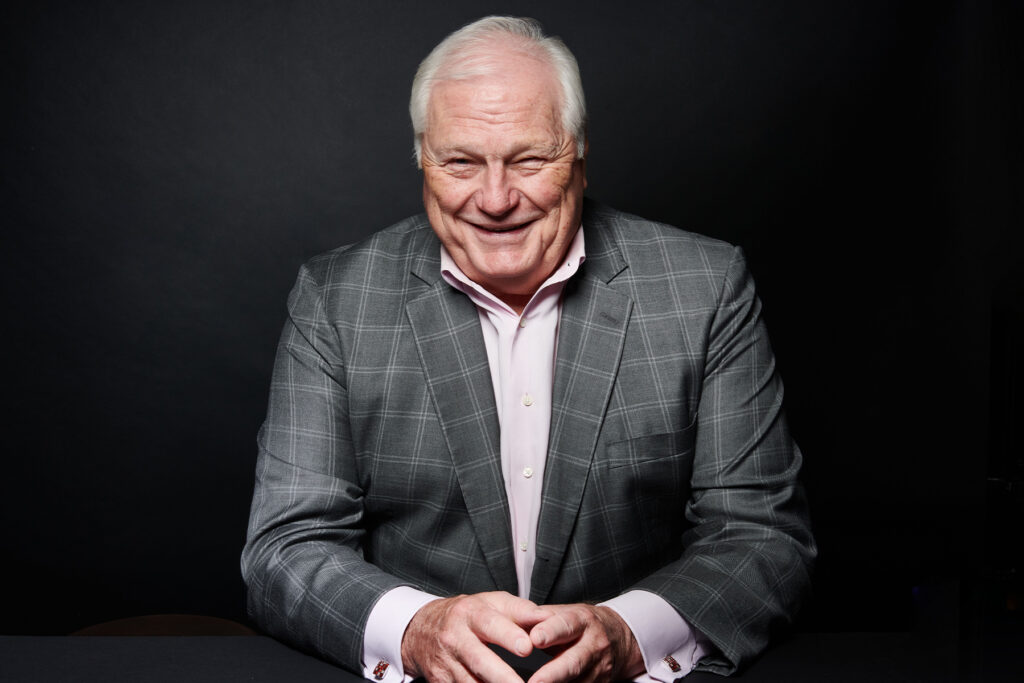
No one is more surprised than Hansen himself. One month earlier, he sat in his dining room, a warm, Western-themed space with faux antlers for a coat rack and a painting of three mares on the wall, recalling how impossibly long those first 13 weeks seemed. Hansen knew WFAA was wary of his combative reputation; he’d later learn that Marty Haag, the legendary news director, told a colleague, “I expected him to walk into the room with hand grenades strapped to his belt and two loaded pistols.” So when they presented Hansen with an offer the week after CBS 4 fired him, “I told them you can make it day to day for all I care,” he says. He couldn’t conceive of a world in which he escaped getting canned again.
By now you know the rest: the Unplugged commentaries and the awards, the Cowboys’ radio booth and Ellen DeGeneres’ couch, the SMU investigation and Thank God for Kids, Barry Switzer and Michael Sam. No Dallas television personality has ever been more polarizing, and perhaps none as talented, either. He worked hard, partied harder (although Chris insists that, when at home, he only drinks when company’s over), and jived best with equally brash personalities who kept pace in both pursuits. He golfed with Mike Modano, vacationed with Troy Aikman, and right about the time he figured to be winding down, the Sam commentary, which he delivered in 2014 at the age of 65, rocketed him to the national consciousness. The ensuing seven years have been his favorite of his career, the time when he felt more empowered than ever to speak his mind because his finances were stable, his legacy secure, and a broader audience was eager to hear him veer into issues outside of sports.
No wonder retirement seemed so far-fetched. Sure, he groused more often over the last several years, but in the end, his situation was too good to walk away from. “C’mon man, what are you going to do?” WFAA meteorologist Pete Delkus, Hansen’s close friend and on-air sparring partner, would lecture him. “Your life’s not going to change. You’re still going to play cards. You’re still going to play golf. And you come to Channel 8, and you get to be on TV, and you get to hear yourself talk. How great is that?”
Then the calculus changed. Some of it was the pandemic, a touch of it his nightly commute. A chunk of it was what he refers to as “the dumbass joke” he made last October on air about women’s pay, one he says was intended to sneer at outdated pay disparities but instead was received as sexist. Much more of it was the implications of that joke. Ever since former Cowboys PR man Greg Aiello first characterized him as such, Hansen has always considered himself “a frustrated stand-up comic in a fat sportscaster’s body.” Comics make jokes and, Hansen argues, the very nature of comedy—especially his brand of it—toes the line between entertainment and aggravation.
“I’m always looking to make people laugh, and when you do that, in my opinion, you will eventually get around to offending almost everybody at some point,” he says. For decades he felt assured that the station would back his plays, even encouraged them, from Haag all the way through former news director Michael Valentine, who instructed him and Delkus to, as they both recall, “do and say things that make a 13-year-old boy laugh.” But more recently he sensed the station’s appetite for provocation wasn’t as healthy as it once was.
“The last couple of years, it’s been like, ‘Are you sure you want to say that?’ ‘I don’t think we should run that commentary now. It doesn’t flow in our show.’ ‘I think you’re going to offend whatever segment of the audience,’” he says.
With each passing year, he became a little more aware that the world isn’t the same place it was in 1983. He recalls a time not so long ago when he laced into a coworker for a mistake—hardly uncommon for him, but it still merited a talking to from a manager. That was nothing compared to what Haag used to do, Hansen argued, having lived through the culture of fear that sharpened WFAA into one of the country’s premier newscasts in the ’80s. “The manager looked at me and said, ‘Marty Haag can’t work here anymore,’” Hansen says. “And, it just—oof. But I think that’s true, I really do.” He knew there was still a place for him on TV, should he want one; none of the wariness he harbored toward the station and vice versa ever turned acrimonious. Eventually, finally, he just wore out. “There weren’t any problems that I couldn’t have fixed if I had wanted to,” he says. “But it just kind of reached a point where I didn’t want to fix them anymore.”
He says he went through two days of buyer’s remorse— “48 hours of legitimate ‘What the hell have I done?’” Once that dissipated, catharsis set in. He’d simply rather be other places now than at the station, nowhere more than at home in Waxahachie. He and Chris scaled down four years ago, trading in their 60-acre estate on the water for a comparably modest spot more inland (it’s still 40 acres).
The two homes and their accompanying menagerie of animals, among them horses, longhorns, and a miniature donkey named Edward R. Burro, have been written about so often that it borders on a trope: the loud sportscaster curiously at peace in the quiet. The fact is, he says with a chuckle, “I like crowds, but I don’t like neighbors.” He enjoys that he can belly flop naked into his pool and piss in the bushes with impunity, and while he sometimes misses those seismic parties out on the lake—he constructed a pavilion for bands to play in precisely once a year—he adores the more intimate dinner parties they now host on the patio. “This is the place where I’m pretty sure—at least I hope, physically—that someday they will carry my fat ass out of here,” he says.
The new place also shares a name with the old one: Moonshadow Ranch, an homage to a country song by T. Graham Brown called “Moonshadow Road.” It’s a ballad about the things young love transcends; Just a boy and a girl/ We found out all we need to know/ Out on Moonshadow Road, as part of the chorus goes. He and Chris have each other, and Moonshadow, and that’s as good a start as any to whatever comes next.
Now, at the end, the thing he’ll miss most is the salary that allowed him to pick up every bar tab, the way he has done for decades. If that proves to be his greatest concern, then he’ll know he did it right.
“I’ve been incredibly blessed, incredibly lucky, to do this nonsense,” he says, his voice trailing off before the frustrated comic lines up one more joke. “And especially in the glory days, when it paid stupid money.” He collapses into laughter.
✰✰✰
It’s a Hansen family ritual to leave the television on for their dogs whenever they leave the house. Tonight, the dial stays on WFAA —“so you can watch Daddy’s last broadcast,” Chris coos. The two couples pile into his black Lincoln Navigator at 8:04: Hansen at the wheel, Livingston riding shotgun, their wives behind them. The sky is muted bands of indigo and orange as the Navigator trundles toward Moonshadow’s iron gate.
“When you come through this gate the next time, my dear, you’ll be retired,” Chris tells her husband from the backseat as he gabs with Livingston.
She gets no acknowledgment.
“Did you hear what I said?” she asks as the gate creaks open.
“I tried to ignore it,” he replies.
✰✰✰
There’s a speech he thinks about more often than he used to: Teddy Roosevelt’s “Citizenship in a Republic,” more commonly known as “The Man in the Arena,” the jeremiad about how only those striving for something truly experience its virtues. Hansen believes certain people have their own arena. For him, it’s television. For Tex Schramm, the legendary Cowboys personnel man, it was football. The architect of Tom Landry’s dynasty spent 40 years in NFL front offices, 30 of them in Dallas. “One of the most vibrant, aggressive, cocky, arrogant individuals I’ve ever known, and I loved him—I just loved him,” Hansen says.
After Schramm retired, Hansen invited him to be the guest of honor at a benefit for Dallas Can!, the nonprofit Hansen served as spokesman of for nearly two decades. He barely recognized the man he saw when Schramm arrived. His voice was softer, his demeanor subdued. He seemed smaller, diminished. “When they pushed him out of the arena, he just shrunk,” Hansen says. Schramm battled health issues for years, yet to this day, Hansen wonders how much of a role retirement played in his demise. “Was it because of the arena?” he says. “Was he like the flower under the lamp?”
No such fate is preordained for Hansen, but he worries nonetheless. “First retirement, then death,” he’s prone to telling Chris, only half kidding. He got an early taste of retirement during the pandemic, and he didn’t take to it well. WFAA’s sports team didn’t step foot in the studio for more than a year, during which time he filmed his nightly sportscast out on his patio, the swimming pool lit up behind him. With no commute to deal with, his workdays were all of 40 minutes, giving him the rest of the day to laze about. He spent most of his nights last summer in his chocolate leather recliner bingeing comedy specials on Netflix until 4 a.m., whereupon he’d crawl into bed, sleep as late as noon or 1, and then return to the recliner in his bathrobe. He estimates he packed on 40 pounds. “They talked about the ‘pandemic 19’ or something,” he says. “Pfft. I gained, like, a family.”
It can’t be that way this time around, and he knows it. What he doesn’t know is the best way to fill the hours. He never kept a long list of hobbies, and that number dwindled further once he gave up golf four or so years ago. These days, it’s poker and tending to the ranch on a zero-turn mower. He’s planning to accept more speaking gigs, but those in his orbit are leaning on him to find a more regular commitment, some arena in which he can still play Dale Hansen, even for just a few hours a week. The early favorite would be something in politics, although Chris and Livingston are convinced his future lies in consulting. Perhaps podcasting. It’s also hard to imagine the greatest presence in Dallas sports media abandoning the field altogether. He’s too competitive, too Hansen.
“I’m certain that he and Chris will be watching some Cowboys game, and he will have an immediate thought about something he wants to say about Jerry, or about Dak, or about Stephen, or about anybody, and it will eat him up that he doesn’t have 100,000 people to get that message out to,” Moyal says.
But whatever form those ventures take would only amount to snippets of his old career—a career that ballooned into his identity. Perhaps that was inevitable. He never shelved the insecurity of being a high school graduate from small-town Iowa in a world of brand-name j-school alums, couldn’t shed the baggage of getting bounced from one too many stations. “I’ve thought just about every week of my life that I’m about to be fired,” he says, and so he staved off professional mortality seven days at a time by outworking the competition. Somewhere along the way, passion bled into obsession. “I recognize now that nobody’s on their deathbed saying, ‘Man, if I could just go to the office one more time,’” he says, tapping the dining room table with each word. “But I might be that guy.”
He simply cannot ignore the math: for more than half his life, “Dale Hansen, Channel 8 sports” is how he’s been introduced, recognized, categorized, consumed. “This is exactly who I am. This is everything I am. And now I’m walking away from that,” he says. He readily admits he enjoys the perks—the money, sure, but also the recognition. How the drop of his name, like a magic trick, can free up a table at a fully booked restaurant or produce tickets to a sold-out show; how the valet at Javier’s will have the Navigator waiting as soon as he reaches the curb.
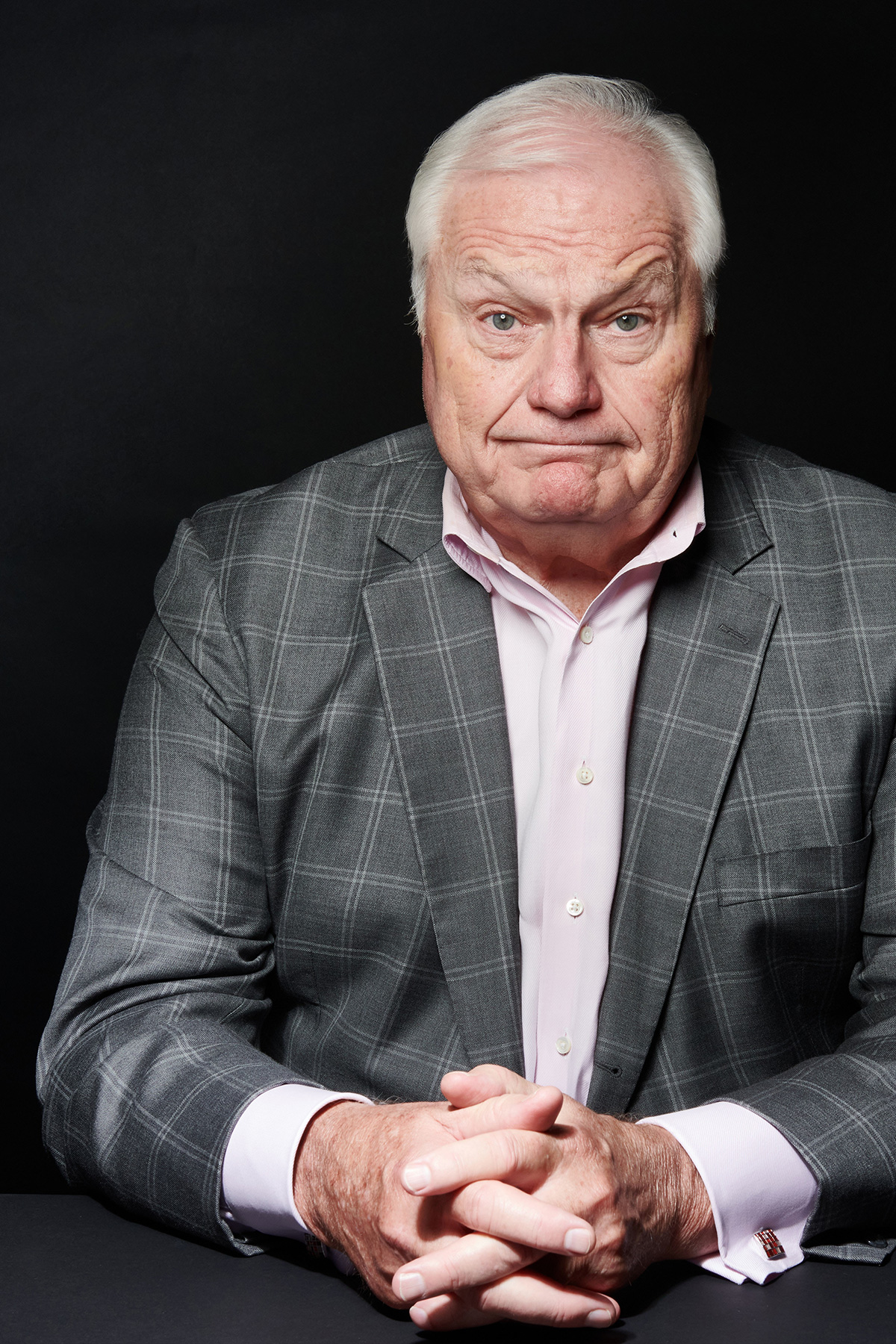
Chris told him for years that they could move anywhere he’d like upon his retirement—back home to Iowa, perhaps, or maybe return to where they met in Omaha. She surmises part of why Dale resisted goes beyond his well-documented love for North Texas. “He doesn’t say this, but I think he’s not known there,” Chris says. “You know, he’s known here. He’s not known there. So I don’t know if he wants to be not well known.”
Ever fatalistic, he’s girding himself for precisely that. “You’re not going to be calling me to sit down and chat two years from today,” he says. “Dunham and Miller [The Ticket’s morning show] aren’t going to wake me up in the morning and joke about something two years from today. People aren’t going to email me and say, ‘Oh, my God, Dale, you’ve got to attack Jerry Jones for this, Dale. You just have to. I’m looking forward to it, Dale.’ They won’t do that two years from today.”
He expects he’ll always miss it—almost needs to, because “if I don’t miss it two years from today, then maybe it wasn’t what I think it is,” and that would sting worse than any regret. The snippets won’t—can’t—paper over that hole on their own. But he hopes they don’t have to. “People just think I’m whistling past the graveyard here, but I don’t think I’m going to miss the spotlight as long as I have a light,” he says. Television amplified his reach, but as someone who is “so arrogant and egotistical that I don’t think I am arrogant and egotistical,” he gets a charge out of holding court to audiences of any size. He believes he can find enough of a rush right at home at Moonshadow, entertaining his friends with his wife.
“I’m not going to deny it: I enjoyed the spotlight,” he says. “But what I really enjoy is the light on the patio.”
As long as he can do that—and he plans to do a hell of a lot more of it now that his schedule is wide open—he thinks he’ll be just fine.
✰✰✰
The south side of WFAA’s building won’t pass muster after the holiday weekend: white tent, white curtains, white tablecloths on high-top tables, white barstools, white flowers. Chris, Dannie Livingston, and his wife are joined by a strict guest list of friends and WFAA higher-ups, the number curtailed more than Hansen would prefer on account of safety precautions. They’re served beer and wine at a bar with “HANSEN The Final Broadcast” embossed on the front. The whole setup is, well, classy.
James Marsh, a former Hansen protégé who started working for him at 18 years old and has since become a record executive, brings him a box of cigars. Eric Moyé, judge of the 14th District Court and one of Hansen’s oldest friends in Dallas, gives him a Rolex. A small crowd assembles on the front side of the studio to watch the show. An older couple has even made a sign: “Happy Retirement—Keep It Unplugged” in multicolored lettering on one side, “Hansen For Governor” in black on the other. Their ranks swell to about 25 by the time Sean Hamilton, WFAA’s director of sports and special projects, directs Hansen’s guests to the front of the studio at 9:52. They split into two lines outside a taxi cab, the final flourish on a vignette re-creating the famous promotional video announcing Hansen’s arrival in 1983 from Channel 4, right down to the same cab driver.
The opening live shot has Hansen bounding down the line like a basketball player introduced in the starting lineup. He claps Marsh on the back and rubs his head, then hugs Moyé. He kisses Chris on the cheek before strolling into the studio for some last banter with Delkus. “This is going to be your favorite newscast. You know why? Because it’s going to be all about you!” the meteorologist razzes him.
Twenty-seven minutes later, the show emerges from its last commercial break with Hansen alone in front of the camera. He begins to recite his final commentary:
“I’ve always been afraid of this day because I’ve always known this day was coming. My dad said that to me when my mom died, and now I understand just a little bit of what he felt that day. A part of me does die tonight—maybe the best part…”
✰✰✰
Dale Hansen is a husband, a father, a grandfather, a brother, and a friend. He was most of those things before he ever appeared on camera, and he will remain all of them after he signs off. He knows that one or more of those roles is a more socially acceptable epitaph than sports broadcaster. He might like himself better if that rang true for him. But, like always, he means what he says: his viewers got the best part of him. “It’s just, if I was to sit down and say, ‘OK, tell me all the great, good things you’ve done in your life’ probably TV’s it,” he says. His tone has flattened, the trademark Hansen bombast nowhere to be found. “I’m not real happy about a lot of the things I’ve done in my life. I’m not real happy about the way I’ve treated a lot of people in my life.”
That begins with the ones he loves most. Although he believes he has improved considerably in both departments, he considers himself “not a very good husband” and “never a very good father.” Neither of his children is currently speaking with him, and he hasn’t had a relationship with his college-aged grandson since he was a child. Chris’ passion is equestrianism; Dale has never seen her show a horse. There’s no telling the number of late nights he’s spent at a bar or a card game among his friends, but he missed out on plenty of their important milestones, too.
It’s easy to chalk that up to the strain of his profession, to his compulsion to conquer it and the sheer hours it took to do precisely that. That’s how all of this began: when he was working a radio job in Saint Cloud, Minnesota, his first wife, his children’s mother, demanded he pick the business or her. He chose his career and in many ways never stopped choosing it. Television became the cure and the disease, his liberation from the 9-to-5 life he says would have driven him “to swallow a bullet” at the expense of an environment that might have better fostered a nuclear family. It provided the fulfillment he felt he needed to have any shot at being a good father, and it fulfilled him so well that nothing else quite measured up.
After all, he notes, Delkus works the same shifts and, outside of extreme weather events, is at the dinner table every night his children are home, beaming up the Tollway to his home in Plano after the 6 o’clock show and back down in time for the 10. “The number of times that my kids would sit around the dinner table with me, [it] wouldn’t take you long to get there,” Hansen says. The charisma that crackled on TV screens across Dallas for 41 years, that cemented him as a broadcast journalism icon? If anything he does on camera borders on an affectation, it’s that, not for lack of trying, “I don’t necessarily bring that same enthusiasm to everything else,” he says. “That’s why I had two wives. It’s why my kids don’t talk to me right now.”
But television also made him rich, and while much of that windfall went toward his lifestyle, he gave plenty of it away, too. There’s an entire library of stories about his generosity, many of which he has actively suppressed. At WFAA, he has made down payments on coworkers’ homes, paid medical bills, put them up in his guest house, and funded one of their dog’s surgeries (which in turn led that dog’s owner to name the dog after him), to say nothing of the times he has offered to cut his own salary to ensure raises for his colleagues in the sports department. Delkus’ favorite story, which predates his own time at the station, is the year Hansen filled one of his wife’s horse trailers with bicycles for WFAA’s Santa’s Helpers Christmas charity drive back when Troy Dungan ran it, a gesture Dungan couldn’t wait to get on the newscast—until, that is, Hansen threatened to kick the venerable weatherman’s ass if any of it made air.
He ups the ante for those in his circle. Years earlier, back in his Omaha days, a friend had loaned him some money when he was dead broke. Hansen promised not only to repay him but to make it up to him for the rest of his life, which is why he sent the man’s entire family on a cruise decades later. For as much as he loves country living and harbors a soft spot for animals, he wouldn’t necessarily pick out an entire ranch for himself; that was Chris’ dream, and “he has given me everything I’ve ever wanted,” she says. He paid for all the things he imagined his children could want and then some: vacations, degrees, cars, houses.
Hansen is quick to downplay that largesse. He knows now that the time, not the money, is what everyone sought most all these years, that no lavish gift could absolve him from feeling like “a half-assed father with a checkbook.” Spending money is easy, he insists. But it’s what he’s able to do. “I think it’s one of the reasons I pick up as many tabs as I do and help as many of my buddies as I have over the years,” he says. “I’m trying to pay it all back.”
He could weigh one side of the ledger versus the other ad nauseum, the life he gave away to become Dale Hansen against the life becoming Dale Hansen gave him in return. But he long ago stopped regretting his chosen path. “Knowing what I know now, there’d be some minor tweaks along the way, but if you said to me, ‘Hey, here’s how this is going to play out, but you have to do it exactly this way,’ I’m in,” he says. “It was absolutely worth it. Because it’s the only thing I could do.”
Now that life is over, and if retirement decouples him from his identity, it also liberates him from its burdens. He no longer has to be anywhere he doesn’t want to. He no longer has to see anyone he doesn’t want to. He can adopt as few or as many of those snippets as he’d like. His hours are his to do with as he chooses.
Which is why, for all the talk of consulting and politics and podcasts, Delkus has urged his friend to first channel his energy into his relationships. “You can’t undo what you’ve done,” Delkus told him. “But you can go back and fix some of those things that you’ve done. Because now you’ve got time.”
It appears he is taking the message to heart, and it starts with Chris. His longtime friend and first producer at WFAA, José Gant, recalls what Hansen told him when Gant called him for his birthday last month: “I’m going to be the husband I need to be.” They’ve got a travel bucket list, with destinations ranging from Graceland to Switzerland. But it’s about the small gestures, too. He wants to do his part around the house: the dishes, the trash—easy tasks, yet ones he never bothered to do before. He has even volunteered to clean the animal stalls on a couple of occasions, refusing to consider the job done until he was covered in sweat, and “you could have laid in it, it was so clean,” Chris says. He has promised her he won’t backslide into his pandemic inertia, and to prove it, he spends 30 minutes each day on the treadmill. They’re planning on more date nights out in Waxahachie. They’ve talked about volunteering together.
He’s afraid it’s too late to start over with his grandson, but perhaps it isn’t with his children. Whatever happens, he has his granddaughter. His face crinkles when he brings her up, his voice filled with every bit of the joy he radiates on camera. “I have this unbelievable relationship with her,” he says. “Twenty-seven years old, she calls every Friday, and if I don’t answer the phone she just says, ‘Hey, checking in, just so you know I still love you more.’ … She’s just fabulous.”
He dreaded retiring for so long in part because he presumes the next big moment on the horizon will be his funeral. But he’s been wrong plenty of times before. He never was supposed to be a television star, never presumed he’d bring down an entire athletic department, never conceived of reaching his professional peak as a senior citizen. Everything about the last 41 years defied prediction because he was too unexpected, too unconventional, to tread lightly and live dully. Why should a Dale Hansen retirement be any different?
✰✰✰
No sooner does the 10 o’clock newscast give way to Jimmy Kimmel than Hansen exits stage left, out to his reception, where he is greeted by a kiss from his wife and applause from his friends. He loops around the building to acknowledge the small crowd, shaking a few hands and dispensing some fist bumps. “Don’t stop talking, Dale!” one man shouts at him. “I won’t,” Hansen assures him.
It isn’t long before he’s perched on a barstool in the tent, Pinot in hand, retelling old tales while bathed in blue light accent lighting. It’s supposed to be an early night—his farewell dinner planned for Friday, when he and Chris will be joined by 15 friends, will be the real rager—but once WFAA shuts the party down at 11:30, Hansen calls an audible. Soon, about 10 of them are holed up at Javier’s, where he puffs on a cigar and sips Mexican martinis until 1:20 in the morning.
He’s back home an hour later, and opens the door to a cacophony of barks and late-night WFAA programming. Still, Hansen’s not ready for bed just yet. It’s warmer than he’d prefer out in the yard. No matter. He directs Dannie, Chris, and Kathy outside to sit and share each other’s company a while longer. He closes the patio door behind them to block out the chatter on television.
Write to [email protected].
Get the ItList Newsletter
Author

